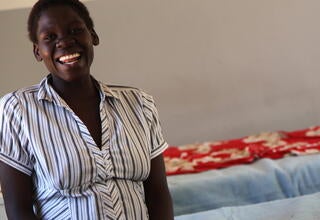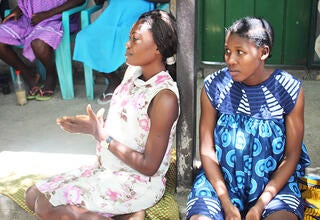Today the United Nations Country Team (UNCT) in Zimbabwe pays tribute to adolescent girls in the country as the world marks the International Day of the Girl Child under a global theme - “My voice, our equal future”.
The 2020 theme calls us to reimagine a better future inspired by the ideas and innovations of adolescent girls.
Girls in Zimbabwe, as in the world over, face myriad challenges, including gender-based discriminations that result in less opportunities across a range of sectors like education, training and employment, compared with boys.
By age 19, when most children are expected to be starting their university or tertiary education, half of the girls in the country are already married. [1] Reducing the chances of girls being able to pursue their aspirations and dreams.
Girls and young women under the age of 24 account for 30% of maternal deaths in the country.[2] One in three women and girls in Zimbabwe experience sexual and gender-based violence at least once in their lifetime.[3]
The prevailing humanitarian and economic challenges in the country, and the added burden of the COVID-19 pandemic have shown that gender inequality continues, as women and girls bear a disproportionate brunt of the socio-economic hardships.
To address the deeply rooted challenges girls and young women face in Zimbabwe, the UN and its partners support national development priorities in education, skills training, protection of children, HIV and AIDS, food security.
The UN team in Zimbabwe are also working to ensure that girls in rural and urban areas have access to information and services on sexual and reproductive health.
Through strong and ambitious partnerships such as the Spotlight Initiative, funded by the European Union, the UN is working with the Government of Zimbabwe, Civil Society Organizations and communities to eliminate violence against women and girls.
Promoting the rights of the girl child demands a commitment to ensure that policy and laws are in place and enforced, preventative and supportive services are available, including access to justice and the UN continues through its programmes to support all Zimbabwean stakeholders to uphold the rights of the girl child.
Despite the myriad of challenges, girls are breaking boundaries and barriers posed by stereotypes and exclusion, including those directed at children with disabilities and those living in marginalized communities. As entrepreneurs, innovators and initiators of local, national and global movements, girls are creating a world that is relevant for them and future generations.
The 2030 Agenda for Sustainable Development and its 17 Sustainable Development Goals is about ensuring no one is left behind.
On the occasion of the International Day of the Girl Child, the UN Country Team in Zimbabwe renews its commitment and calls on all stakeholders to support and amplify the demands and voices of girls to:
- Live free from gender-based violence, harmful practices including child marriages, and HIV and AIDS;
- Learn new skills towards the futures they choose; and
- Lead as a generation of activists accelerating social change
International Day of the Girl Child has been commemorated since 2011, when the UN General Assembly adopted Resolution 66/170 in recognition of and commitment to address the unique challenges girls face in the world.
[1] Zimbabwe Demographic Health Survey (ZDHS), Zimbabwe National Statistics Agency, 2015. 91.
[2] Multiple Indicator Cluster Survey (MICS), Zimbabwe National Statistics Agency, 2019, 129.
[3] ZDHS, 2015, 343.




